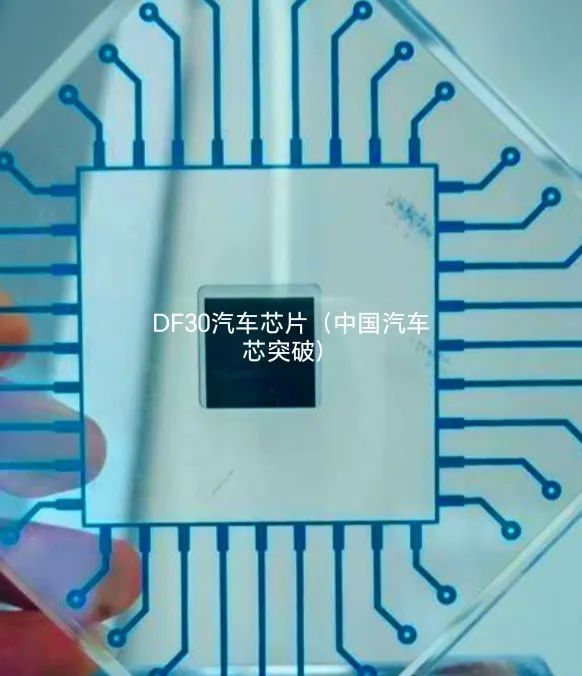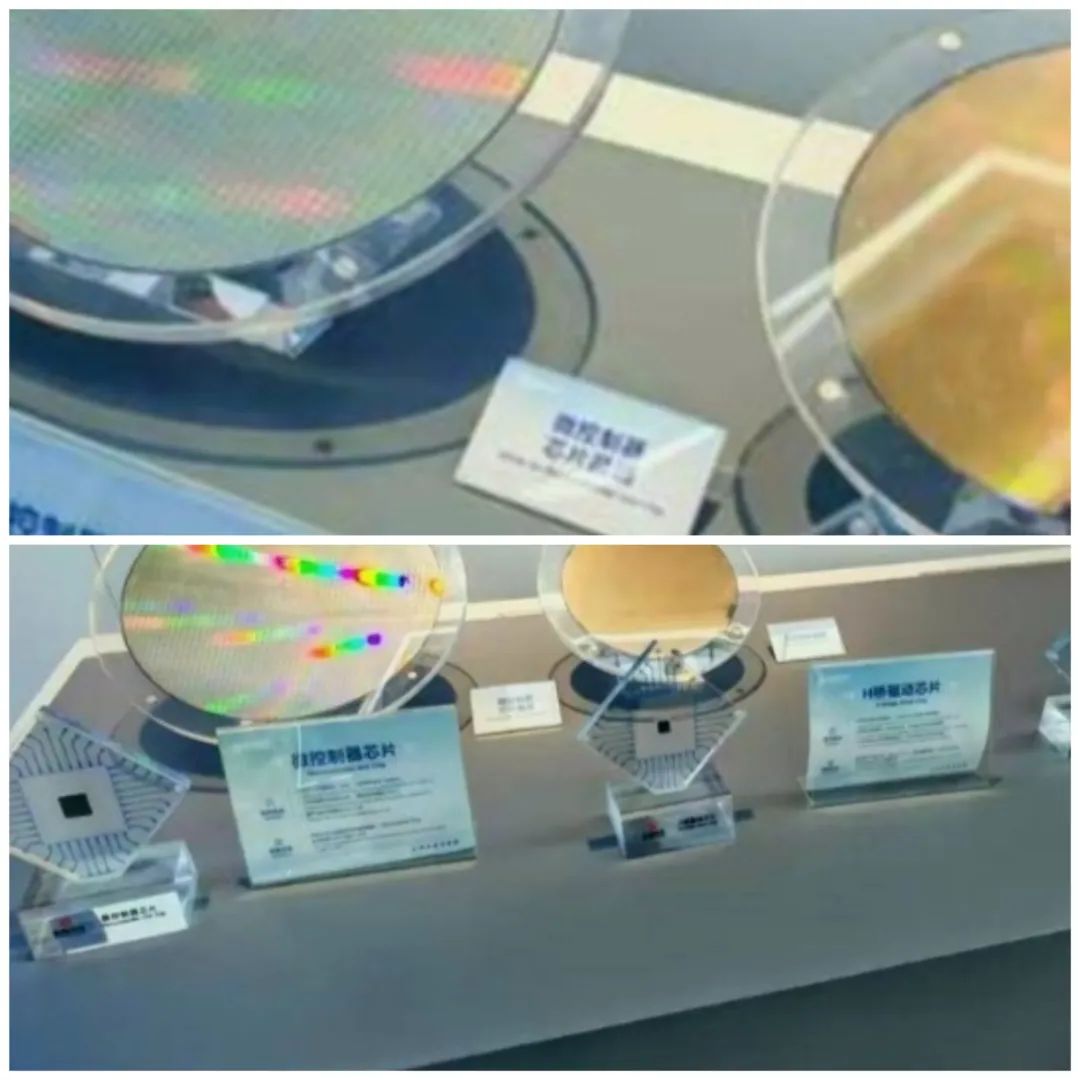The Chinese chip industry is rapidly developing, with most chips being tackled by our enterprises. However, high-end automotive chips are still in a “blank period,” with car manufacturers having only a few foreign companies’ products to choose from in their supply chains. The breakthrough in automotive chips is urgent.

On April 3, at the Dongfeng Motor Global Innovation Center, Zhang Fanwu, Chief Engineer of Intelligent Technology at Dongfeng Motor Research Institute, announced that the first domestically produced automotive-grade high-performance MCU chip, DF30, has completed its first tape-out (trial production) verification, and automotive-grade validation will begin soon, with plans for mass production next year. This achievement is highly commendable and encouraging for the domestic automotive chip market.
Zhang Fanwu from Dongfeng Motor stated that to create this Chinese “chip,” Dongfeng “has walked the most difficult road.”
A typical car has 25 to 50 controllers, requiring 500 to 1000 chips, of which 90% have been domestically produced. The MCU chip falls within the remaining 10%. “We started by tackling a ‘hard nut.'” Zhang Fanwu explained that in 2022, Dongfeng Motor took the lead, collaborating with eight enterprises, including China Information Technology Binary Semiconductor Co., Ltd., to establish the Hubei Automotive Grade Chip Industry Technology Innovation Consortium.
This model involves Dongfeng Motor proposing demands, with downstream companies responsible for design, manufacturing, etc., creating a complete chip industry chain.

This collaborative R&D model is an exploration within the industry and was not initially smooth. During the collaboration, Dongfeng Motor proposed using a key module in the chip, while the design company insisted on using another module instead. The first tape-out verification failed due to the absence of this key module, preventing the development of a basic function for the controller using this chip.
“What we are doing is a task from 0 to 1, with no templates to refer to. Everyone has their own ideas, leading to such collisions.” Zhang Fanwu said that the tacit understanding has gradually grown through these discussions and confrontations. Now, the communication mechanism within the innovation consortium is becoming increasingly smooth and efficient.

It is understood that the DF30 chip has a wide range of applications, suitable for fuel vehicle engines, chassis, and also for the three electric systems of new energy vehicles, with functions and performance comparable to international counterparts. In February of this year, Dongfeng Motor completed cold region testing of the power controller based on DF30 in Mohe, Heilongjiang, achieving the expected goals and strengthening the team’s determination to complete the chip development with high quality and confidence in its industrialization, with plans for hot region testing in Turpan this summer.
According to semiconductor industry insights, on November 9, 2024, the DF30 chip will be officially released at the 2024 conference of the Hubei Automotive Grade Chip Industry Technology Innovation Consortium. The successful development and upcoming mass production of the DF30 chip not only inject new vitality into the domestic automotive chip industry but also provide strong support for the intelligent and autonomous development of China’s automotive industry. The release of the DF30 chip marks a significant breakthrough for China in the field of high-performance automotive-grade MCU chips, filling a gap in the domestic industry.
“Verification is another major challenge in automotive chip development. Dongfeng is the automotive enterprise with the most comprehensive variety of vehicles in China, capable of providing the most comprehensive instance scenarios for chip verification,” Zhang Fanwu stated. In the next step, Dongfeng Motor will also develop other models of DF30 for different application scenarios, achieving product series development while also conducting research on domain controller chips.
It is reported that the DF30 chip is the industry’s first automotive-grade MCU chip developed based on an independently developed open-source RISC-V multi-core architecture, using domestic 40-nanometer automotive-grade technology. This choice of architecture and technology not only ensures the chip’s high performance but also achieves a fully domestic closed loop.
According to reports, the chip’s functional safety level has reached ASIL-D, the highest level in automotive safety integrity, indicating its high reliability in terms of safety. The DF30 features four major characteristics: high performance, strong controllability, ultra safety, and extreme reliability. It has passed 295 rigorous tests, including basic testing, stress testing, and application testing, and can adapt to extreme cold and heat environments.
Why is the localization of automotive MCU chips so difficult? Automotive MCUs mainly process data related to vehicle operation and in-car entertainment, requiring chips to have ultra-fast response times, stable performance, long lifespans, good scalability, and high computing power. Automotive MCU chips must maintain stable operation in extreme environments, with operating temperature ranges covering -40°C to 155°C, and a lifespan of 15 years or more, with durability and reliability requirements far exceeding those of consumer-grade and industrial-grade chips. Typically, automotive MCU chips need to integrate high-density logic circuits and large-capacity non-volatile memory (such as Flash) on the same chip, while the manufacturing processes for both differ significantly, leading to prominent technical mismatches. Automotive MCU chips need to support various functions and interfaces, such as CAN, LIN, FlexRay communication interfaces, as well as various sensor and actuator interfaces, resulting in high design complexity. The certification cycle is long; automotive MCU chips must pass multiple stringent certification systems, including ISO 26262, AEC-Q100, and IATF 16949, with the entire certification process typically taking 3-5 years, characterized by long and uncertain certification cycles. The certification process is not only time-consuming but also requires significant financial investment, posing a huge challenge for new entrants.
R&D investment is substantial; from defining requirements to actual mass production, an automotive-grade chip typically requires 3 to 6 years, with long investment cycles and slow returns. The R&D costs are extremely high, causing many capital and enterprises to hesitate, preferring not to develop in-house and instead opting for direct acquisition.
The global automotive-grade MCU market has long been dominated by international manufacturers such as Renesas, NXP, and Infineon, which hold over 95% of the market share, creating strong market barriers.
Due to the automotive industry’s extremely high safety requirements, coupled with concerns about the stability of domestic MCUs, many automotive clients prefer to choose market-validated foreign brands. The design adjustment costs and potential risks associated with switching MCUs make many clients reluctant or unable to easily replace existing suppliers. These factors have led to the slow development of China’s automotive chip industry, slow technological progress, and the automotive enterprises’ voice being controlled by chip manufacturers. Now, with Dongfeng Motor’s breakthrough in automotive chips, it has instilled confidence in Chinese automotive enterprises and brought significant changes to the global automotive chip industry landscape, paving the way for a new automotive chip paradigm in the future.